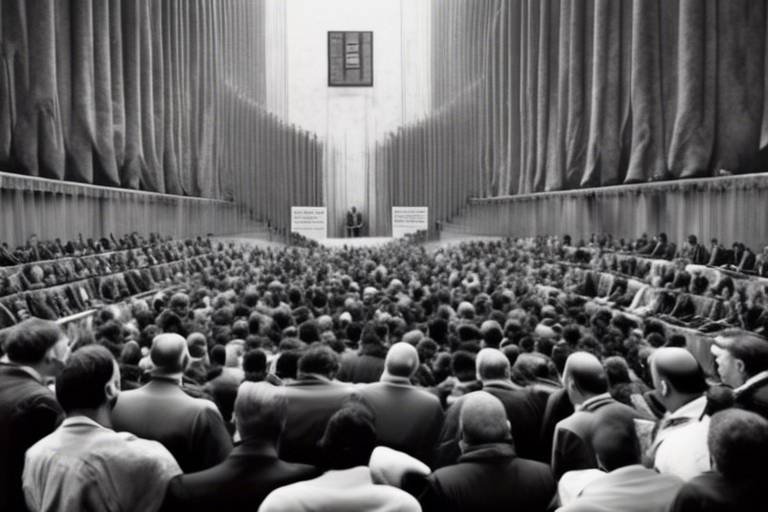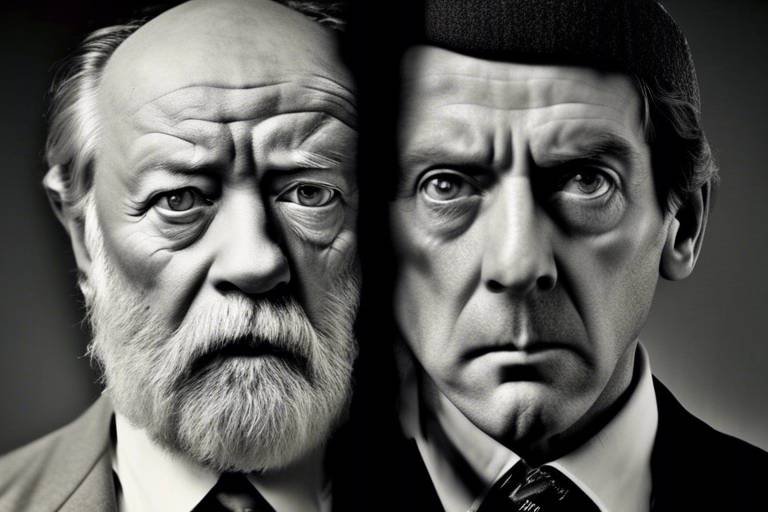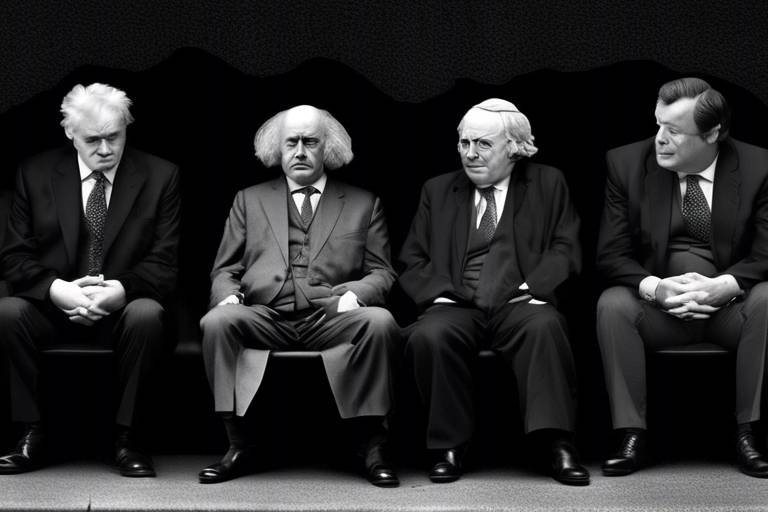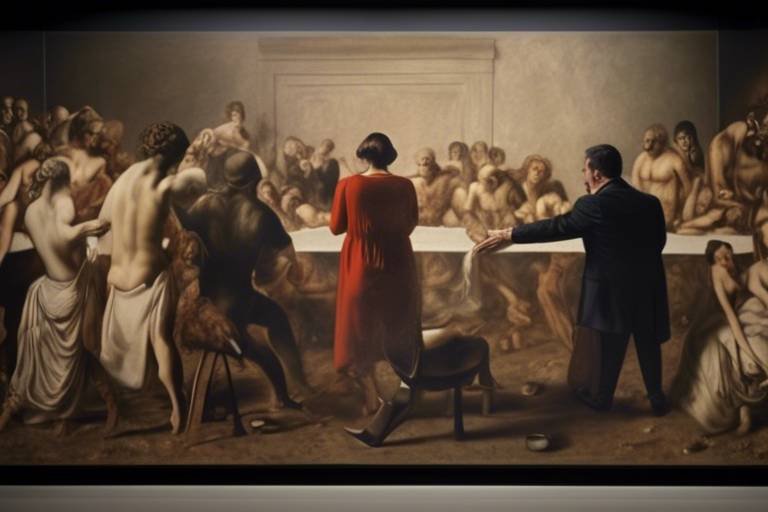The Political Implications of Cartesian Philosophy
Cartesian philosophy, originating from the profound thoughts of René Descartes, has left an indelible mark on various fields, including politics. At its core, Cartesian philosophy emphasizes the power of reason and individual thought, which has significant implications for political thought and governance. In an age where traditional authority is often questioned, the principles of Cartesian rationalism serve as a beacon for understanding the legitimacy of power and individual rights. But how does this philosophical framework translate into the political arena? Let’s delve deeper into the political implications of Cartesian philosophy and explore its relevance in contemporary discourse.
One of the most striking features of Cartesian thought is its insistence on skepticism and doubt as tools for inquiry. Rather than accepting established norms without question, Descartes famously proclaimed, "Cogito, ergo sum" (I think, therefore I am), which underscores the importance of individual reasoning. This emphasis on rationality challenges the very foundation of political authority, compelling us to ask: What gives power its legitimacy? In a world where leaders often wield authority based on tradition or force, Cartesian philosophy urges us to seek reason as the bedrock of governance. This shift has profound implications for how we view political systems today.
Moreover, Cartesian philosophy champions the concept of individualism, which is crucial for the development of modern democratic ideals. It posits that each person is a rational being capable of making informed decisions. This perspective has fostered a political landscape where individual rights are not just acknowledged but celebrated. The notion that each citizen possesses inherent worth and the capacity for self-governance is a direct reflection of Cartesian thought. As we navigate contemporary political challenges, from social justice movements to debates over personal freedoms, the influence of Cartesian principles remains palpable.
To further illustrate this point, consider the relationship between the self and society. Cartesian philosophy encourages us to view the self as an active participant in governance rather than a passive subject. This relationship underscores the importance of individual roles within collective decision-making processes. In democratic societies, this means that every voice matters, and every individual has the potential to contribute to the greater good. This notion of participatory governance is a testament to the enduring impact of Cartesian thought on our political landscape.
As we explore the implications of autonomy and political freedom, it becomes evident that Cartesian philosophy lays the groundwork for understanding these concepts. Autonomy, in the Cartesian sense, refers to the capacity for self-governance and making independent choices. In a democratic society, this autonomy is paramount, as it empowers individuals to shape their destinies and participate meaningfully in political discourse. Without this foundation of autonomy, the very essence of political freedom is compromised. Hence, the connection between Cartesian thought and political freedom is not just theoretical; it is a practical framework that informs our understanding of rights and responsibilities in a democratic context.
Furthermore, the ethical dimensions of individual rights, as informed by Cartesian philosophy, invite us to engage in contemporary debates surrounding human rights and social justice. The idea that individuals possess inherent rights simply by virtue of being human resonates deeply within the Cartesian framework. This perspective not only advocates for the protection of individual liberties but also challenges us to consider the ethical implications of our political actions. As we grapple with issues like systemic inequality and discrimination, the relevance of Cartesian thought in informing our ethical stance is undeniable.
Finally, Cartesian skepticism serves as a powerful tool for political critique. By fostering a culture of questioning and critical examination, we can challenge established political systems and ideologies that may no longer serve the interests of the people. This spirit of inquiry is vital in a democratic society, as it encourages citizens to hold their leaders accountable and demand transparency. In essence, the political implications of Cartesian philosophy extend beyond abstract thought; they actively shape our engagement with the political world.
- What is Cartesian philosophy? Cartesian philosophy refers to the ideas and principles developed by René Descartes, emphasizing reason, skepticism, and individualism.
- How does Cartesian philosophy influence political thought? It challenges traditional authority by advocating for reason as the basis for legitimacy and emphasizes individual rights and autonomy.
- What role does individualism play in modern democracy? Individualism, rooted in Cartesian thought, is foundational for recognizing personal rights and encouraging active participation in governance.
- Can Cartesian skepticism help in political critique? Yes, it promotes critical examination of political systems, encouraging citizens to question and hold their leaders accountable.

Rationalism and Political Authority
When we dive into the realm of Cartesian rationalism, we find ourselves questioning the very foundations of political authority. Traditionally, political power was often legitimized through divine right, tradition, or sheer force. However, Cartesian thought introduces a refreshing perspective by emphasizing reason as the cornerstone of governance. This shift not only challenges the status quo but also invites us to reconsider the legitimacy of those in power. Can authority truly be justified if it lacks a rational basis? This question is at the heart of modern political discourse.
René Descartes, the father of modern philosophy, posited that knowledge should be built upon a foundation of certainty and clarity. In the political arena, this translates to the idea that rulers must justify their authority through logical reasoning and evidence rather than mere tradition or coercion. The implications of this are profound: it suggests that citizens have the right to question their leaders, demanding transparency and accountability. In a world where rational thought reigns supreme, the notion of blind obedience becomes increasingly untenable.
Moreover, Cartesian rationalism encourages a more democratic form of governance. By asserting that individuals possess the capacity for reason, it follows that each person has a role in shaping political decisions. This leads to a more participatory approach to governance, where the voices of the many can challenge the decisions of the few. In this light, we can see the emergence of concepts such as social contracts, where authority is derived from the consent of the governed, a radical departure from authoritarian rule.
To illustrate the impact of rationalism on political authority, let’s consider a few key points:
- Legitimacy through Reason: Authority must be justified through rational arguments and evidence.
- Questioning Power: Citizens are empowered to challenge their leaders, fostering a culture of accountability.
- Democratic Engagement: Rationalism paves the way for participatory governance, emphasizing the importance of individual voices.
In essence, the Cartesian approach to rationalism reshapes our understanding of political authority. It compels us to reflect on the nature of power and its justification, urging us to seek leaders who not only wield authority but do so with a foundation of reason. As we navigate the complexities of modern governance, the principles of Cartesian rationalism remain ever relevant, reminding us that a government of the people, by the people, and for the people must be rooted in rational discourse and mutual respect.

Individualism in Cartesian Thought
When we dive into the depths of Cartesian philosophy, we encounter a powerful emphasis on individualism that has profoundly shaped modern democratic principles. René Descartes, the father of modern philosophy, famously proclaimed, "Cogito, ergo sum" or "I think, therefore I am." This assertion doesn't just highlight the act of thinking; it underscores the importance of the individual as a rational being capable of independent thought. In a world where collective ideologies often overshadow personal beliefs, Cartesian thought serves as a beacon, illuminating the significance of the individual in the broader societal context.
But what does this mean for our understanding of democracy and individual rights? At its core, Cartesian individualism posits that each person possesses an intrinsic value and a capacity for reason that legitimizes their existence and participation in governance. This idea challenges us to rethink our roles in society. Are we merely cogs in a machine, or do we have the power to influence the gears of political authority? The answer lies in recognizing that each individual's thoughts and actions contribute to the collective governance of society. This perspective empowers citizens to advocate for their rights and question the legitimacy of those in power.
Furthermore, Cartesian individualism lays the groundwork for the development of personal rights. As we consider the implications of individualism, we must also acknowledge its impact on the evolution of human rights. The notion that each person is a rational agent capable of making choices invites a reevaluation of ethical considerations within political discourse. In many ways, this philosophy acts as a catalyst for the recognition of individual rights, pushing society to embrace the idea that every person deserves respect and autonomy.
In examining the relationship between the self and society, we can see how Cartesian thought influences our understanding of individual roles within collective governance. The interplay between personal freedom and societal expectations creates a dynamic tension that shapes political landscapes. For instance, when individuals assert their rights, they often challenge prevailing norms and push for reforms that reflect their values. This ongoing dialogue between the self and society is crucial for a healthy democracy, as it fosters a culture of critical thinking and encourages citizens to engage actively in political processes.
The Cartesian view of the self as a thinking entity highlights the importance of autonomy in political discourse. Autonomy, in this context, refers to the ability of individuals to govern themselves, make informed decisions, and participate in the political arena without coercion. This concept is vital for understanding the essence of political freedom. When individuals are empowered to think critically and act according to their reasoned judgments, they contribute to a more vibrant and responsive political system. The challenge, however, lies in ensuring that this autonomy is not undermined by external forces, be they governmental, societal, or ideological.
In a democratic society, the connection between Cartesian autonomy and political freedom is paramount. The idea that individuals should have the right to make choices about their own lives is deeply rooted in Cartesian philosophy. This principle not only advocates for personal freedom but also emphasizes the need for a political system that respects and protects these rights. When individuals are free to express their thoughts and beliefs, they foster a culture of innovation and progress, which is essential for the evolution of society.
Moreover, the ethical implications of individual rights cannot be overstated. Cartesian philosophy encourages us to question the status quo and critically examine the rights afforded to individuals within society. This scrutiny is particularly relevant in contemporary debates surrounding human rights and social justice. By applying Cartesian skepticism to political systems, we can challenge injustices and advocate for reforms that uphold the dignity and rights of every individual. The ethical framework derived from Cartesian thought inspires movements aimed at achieving equality and justice, reinforcing the notion that every voice matters.
- What is Cartesian individualism? Cartesian individualism emphasizes the importance of the individual as a rational being capable of independent thought, which has significant implications for democracy and personal rights.
- How does Cartesian philosophy influence modern democratic ideals? It encourages critical thinking, autonomy, and the recognition of individual rights, shaping the foundation of democratic governance.
- Why is autonomy important in political discourse? Autonomy allows individuals to govern themselves and participate actively in political processes, fostering a more responsive and vibrant democracy.
- What role does Cartesian skepticism play in political critique? Cartesian skepticism encourages individuals to question established political systems and ideologies, promoting the pursuit of justice and equality.

Self and Society
In the grand tapestry of human existence, the relationship between the self and society is akin to the intricate dance of two partners, each influencing the other's movements. Cartesian philosophy, with its emphasis on rational thought and the primacy of the individual, invites us to explore this dynamic interplay. At its core, Cartesian thought posits that the individual is not merely a cog in the societal machine; rather, each person is a vital agent capable of reason and reflection. This idea challenges the notion that society defines the individual, suggesting instead that individuals possess the power to shape their social environments.
Consider the famous Cartesian maxim, "Cogito, ergo sum" — "I think, therefore I am." This declaration underscores the importance of self-awareness and personal agency. It implies that our very existence is rooted in our ability to think critically and independently. In a society that often prioritizes conformity, this philosophical stance becomes revolutionary. It encourages individuals to question societal norms and to assert their rights and beliefs, promoting a culture of active participation rather than passive acceptance.
Moreover, the Cartesian view of the self fosters a sense of responsibility towards society. When individuals recognize their capacity for rational thought, they also acknowledge their duty to contribute to the collective well-being. This reciprocal relationship can be illustrated through the following points:
- Empowerment: Individuals who embrace their rationality are empowered to advocate for change, challenge injustices, and engage in civic life.
- Community Engagement: Acknowledging the self's role within society encourages active participation in community initiatives, fostering a sense of belonging.
- Social Responsibility: With individual rights come individual responsibilities; acknowledging this balance is essential for a harmonious society.
In essence, Cartesian philosophy teaches us that our identity is not solely defined by societal labels or roles, but by our ability to think critically and act upon our convictions. This understanding leads to a more engaged citizenry, one that is willing to challenge the status quo and advocate for a more just and equitable society. As we navigate the complexities of modern governance, the interplay between the self and society remains a crucial factor in shaping our democratic ideals.
1. How does Cartesian philosophy influence our understanding of individual rights?
Cartesian philosophy emphasizes the importance of rational thought, which lays the groundwork for recognizing and asserting individual rights. By prioritizing the individual's capacity for reason, it supports the notion that every person has inherent rights that must be respected within a societal context.
2. What role does self-awareness play in societal engagement?
Self-awareness, as highlighted in Cartesian thought, enables individuals to understand their place within society. It encourages them to reflect on their values and beliefs, leading to active participation in social and political discourse.
3. Can Cartesian skepticism be beneficial for societal progress?
Absolutely! Cartesian skepticism encourages individuals to question established norms and ideologies. This critical examination can lead to societal progress by challenging injustices and advocating for change.

Autonomy and Political Freedom
When we delve into the relationship between autonomy and political freedom, it becomes clear that these concepts are not just abstract ideas but fundamental pillars of a thriving democracy. Autonomy, in the Cartesian sense, refers to the capacity for individuals to govern themselves through reason and critical thinking. This notion is crucial because it empowers citizens to make informed decisions about their lives and their governance. But how does this autonomy translate into political freedom? Well, it’s like the difference between being a passenger in a car and being the driver; one is subject to the whims of the driver, while the other is in control of their destination.
In a society where autonomy is valued, individuals are encouraged to engage in political discourse, challenge authority, and express their opinions without fear of repression. This is where the magic happens—when citizens feel empowered to voice their thoughts, they contribute to a more dynamic and responsive political landscape. Think about it: a government that listens to its people is like a gardener who tends to their plants, nurturing growth and ensuring that every voice is heard and valued.
Moreover, the connection between autonomy and political freedom is particularly relevant in contemporary discussions about self-governance. In a world where various forces—be they political, social, or economic—seek to impose restrictions on individual liberties, the Cartesian emphasis on reason and personal agency becomes a beacon of hope. It reminds us that our ability to think critically and act independently is not just a privilege; it is a right that must be fiercely protected. After all, if we allow our autonomy to be compromised, we risk becoming mere pawns in someone else's game.
To illustrate this point further, consider the following table that outlines the key differences between autonomy and political freedom:
| Aspect | Autonomy | Political Freedom |
|---|---|---|
| Definition | Self-governance and personal agency | Freedom to participate in political processes |
| Focus | Individual decision-making | Collective rights and responsibilities |
| Outcome | Empowered individuals | Responsive and accountable governance |
In essence, when individuals embrace their autonomy, they not only enhance their personal lives but also contribute to the overall health of their political system. This symbiotic relationship underscores the importance of fostering an environment where individuals can flourish as autonomous beings while actively participating in the political realm. So, the next time you think about your role in society, remember that your autonomy is not just a personal asset; it’s a vital component of our collective political freedom.
- What is the relationship between autonomy and political freedom? Autonomy refers to the ability of individuals to govern themselves, while political freedom encompasses the rights to participate in political processes. Together, they create a framework for a healthy democracy.
- How does Cartesian philosophy influence modern democratic ideals? Cartesian philosophy emphasizes reason and individual agency, which are foundational to modern democratic principles, encouraging critical thinking and personal responsibility.
- Why is autonomy important in a democratic society? Autonomy is crucial as it empowers individuals to make informed decisions, engage in political discourse, and challenge authority, leading to a more responsive and accountable government.

Ethics of Individual Rights
The ethics surrounding individual rights is a cornerstone of Cartesian philosophy, deeply intertwined with the principles of freedom and autonomy. At its core, Cartesian thought posits that the ability to think and reason is what fundamentally defines human existence. This emphasis on rationality leads to a compelling argument for the inherent rights of individuals. If we can think for ourselves, shouldn't we also have the right to govern our lives according to our own reasoning? This question not only challenges authoritative structures but also lays the groundwork for a more equitable society.
In contemporary discourse, the ethical implications of individual rights often spark fervent debates. For instance, the concept of human rights—which asserts that every person is entitled to certain fundamental rights simply by virtue of being human—finds its roots in Cartesian rationalism. The idea that individuals possess the capacity for reason implies that they should not be subjected to arbitrary power or oppression. This is crucial in discussions about social justice and equality, where the rights of marginalized groups are often at the forefront.
Moreover, the Cartesian idea of doubt serves as an ethical framework for questioning the status quo. By encouraging individuals to scrutinize established norms and practices, Cartesian philosophy empowers people to advocate for their rights and the rights of others. This skepticism is not merely a critique of authority; it is a call to action, urging individuals to reflect on the moral implications of their beliefs and the systems they support. Think about it: if we accept everything at face value, how can we ensure that our societal structures are just and equitable?
To illustrate the ethical dimensions of individual rights, consider the following aspects:
- Autonomy: The right to make decisions about one’s own life is a fundamental ethical principle. In a democratic society, this autonomy is paramount, as it allows individuals to pursue their own happiness and fulfillment.
- Justice: The ethical pursuit of justice demands that individual rights be respected and protected. This includes not only legal rights but also social and economic rights, ensuring that all individuals have the opportunity to thrive.
- Equality: Cartesian philosophy underscores the importance of treating all individuals as equals. This ethical stance promotes a society where discrimination and inequality are actively challenged.
In conclusion, the ethics of individual rights rooted in Cartesian philosophy serve as a powerful guide for contemporary political thought. They encourage us to recognize our own worth and the worth of others, fostering a society where everyone can exercise their rights freely and fully. As we navigate the complexities of modern governance and social justice, the Cartesian emphasis on reason and individual autonomy remains a vital part of the conversation.
Q1: How does Cartesian philosophy influence modern human rights discussions?
A1: Cartesian philosophy emphasizes reason and individual autonomy, which are foundational to the concept of human rights. It encourages critical examination of authority and advocates for the inherent rights of all individuals.
Q2: What role does skepticism play in understanding individual rights?
A2: Skepticism, a key element of Cartesian thought, prompts individuals to question established norms and practices. This critical approach fosters a deeper understanding of ethical implications and supports the advocacy for individual rights.
Q3: Why is autonomy important in a democratic society?
A3: Autonomy is crucial because it empowers individuals to make decisions about their own lives, contributing to personal fulfillment and societal progress. In a democracy, respecting autonomy ensures that citizens can participate fully in governance.

Cartesian Doubt and Political Critique
When we think about Cartesian doubt, we often picture René Descartes sitting by the fire, questioning everything he knows. But what if I told you that this method of skepticism extends far beyond personal introspection? It serves as a powerful tool for political critique, challenging the status quo and encouraging us to critically examine our political systems. Just like a magnifying glass that reveals the hidden flaws in a seemingly perfect diamond, Cartesian doubt allows us to scrutinize the foundations of our governance.
At its core, Cartesian doubt encourages us to ask the tough questions: What is the basis of authority? Are our leaders truly serving the public good? How do we know what we claim to know about our political systems? By employing this skeptical lens, individuals can dissect the legitimacy of political power and the ideologies that underpin it. This process can lead to a more informed and engaged citizenry that refuses to accept things at face value.
Moreover, Cartesian doubt can be seen as a catalyst for political change. When citizens begin to question the narratives fed to them by those in power, they can spark movements that challenge oppressive regimes and outdated ideologies. The Enlightenment era, for instance, was rife with thinkers who adopted Cartesian principles to critique existing political structures. They didn’t just accept the world as it was; they envisioned how it could be. This spirit of inquiry and skepticism is vital for any thriving democracy.
In contemporary politics, we can see the ramifications of this philosophical approach. Take social media, for example. Platforms like Twitter and Facebook have become breeding grounds for political discourse and critique. Here, the principles of Cartesian doubt manifest as individuals challenge the narratives pushed by politicians and mainstream media. The result? A more dynamic political landscape where ideas can be debated openly, and where citizens are empowered to voice their dissent.
However, it’s essential to balance skepticism with constructive dialogue. While questioning authority is crucial, it’s equally important to engage in discussions that lead to solutions. After all, simply tearing down the existing political structure without proposing alternatives can lead to chaos, much like a ship without a captain drifting aimlessly at sea. Thus, using Cartesian doubt as a tool for political critique should also come with a responsibility to seek out and promote viable paths forward.
In conclusion, Cartesian doubt is not merely an abstract philosophical concept; it’s a practical framework that has significant implications for political critique. By fostering a culture of skepticism, we empower individuals to question authority, engage in meaningful discourse, and ultimately contribute to a more just and equitable society. Remember, a healthy democracy thrives on inquiry, and it's our duty as citizens to wield this tool effectively.
- What is Cartesian doubt?
Cartesian doubt is a systematic process of being skeptical about the truth of one's beliefs, famously introduced by philosopher René Descartes. - How does Cartesian doubt apply to politics?
It encourages individuals to critically examine political authority and ideologies, fostering a more engaged and informed citizenry. - Can skepticism lead to political change?
Yes, questioning established norms and narratives can spark movements that challenge oppressive regimes and outdated ideologies. - What is the balance between skepticism and constructive dialogue?
While questioning authority is vital, it’s important to engage in discussions that lead to solutions rather than just tearing down existing structures.

The Influence on Enlightenment Thinkers
The Enlightenment era was a time of profound transformation in political thought, and at the heart of this revolution lay the ideas of Cartesian philosophy. René Descartes' emphasis on reason and doubt inspired a generation of thinkers who sought to challenge traditional authority and explore the nature of human existence. The ripple effects of Cartesian thought can be seen in the writings of prominent Enlightenment figures such as John Locke, Voltaire, and Jean-Jacques Rousseau, each of whom adopted and adapted Cartesian principles to forge new paths in political theory.
One of the central tenets of Cartesian philosophy is the belief in the power of human reason. This notion became a cornerstone for Enlightenment thinkers, who argued that individuals possess the capacity to think critically and independently. For instance, John Locke's social contract theory, which posits that governments derive their authority from the consent of the governed, echoes Descartes' emphasis on rationality. Locke believed that individuals have inherent rights to life, liberty, and property, a perspective that aligns with the Cartesian idea of self-awareness and individual autonomy.
Furthermore, the Enlightenment's push towards secular governance can also be traced back to Cartesian influences. Descartes' method of systematic doubt encouraged thinkers to question the validity of established doctrines, including religious dogma. This skepticism paved the way for the separation of church and state, a concept that would become fundamental to modern democratic societies. Voltaire, for instance, championed freedom of thought and expression, arguing against the intertwining of religious authority and political power, thereby reinforcing the Cartesian ideal of a rational, questioning mind.
Moreover, the social contract theories that emerged during the Enlightenment were heavily influenced by Cartesian principles. Thinkers like Rousseau expanded on the idea of the social contract, emphasizing that legitimate political authority must be rooted in the collective will of the people. This reflects Descartes' notion of the self as a rational agent capable of determining its own fate within a societal framework. The interplay between individual rights and collective governance became a defining feature of Enlightenment thought, ultimately shaping the democratic ideals that we cherish today.
In summary, the influence of Cartesian philosophy on Enlightenment thinkers was profound and far-reaching. By promoting the use of reason, skepticism, and individual rights, Descartes laid the groundwork for revolutionary ideas that would redefine governance and the role of the individual in society. As we navigate contemporary political landscapes, the echoes of Cartesian thought remind us of the importance of critical inquiry and the pursuit of knowledge as we strive for a more just and equitable world.
- What is Cartesian philosophy?
Cartesian philosophy, founded by René Descartes, emphasizes reason, doubt, and the importance of the self as a thinking entity. It challenges traditional beliefs and promotes individual autonomy.
- How did Cartesian thought influence Enlightenment thinkers?
Enlightenment thinkers adopted Cartesian ideas to advocate for reason, individual rights, and the separation of church and state, shaping modern democratic principles.
- Who were some key Enlightenment philosophers influenced by Descartes?
Notable Enlightenment philosophers influenced by Cartesian thought include John Locke, Voltaire, and Jean-Jacques Rousseau, each contributing to the evolution of political theory.
- What is the significance of the social contract in Enlightenment thought?
The social contract is a foundational concept that asserts governments derive their legitimacy from the consent of the governed, emphasizing the importance of individual rights and collective governance.

Separation of Church and State
The concept of the separation of church and state is a cornerstone of modern democratic governance, and its roots can be traced back to Cartesian philosophy. This idea posits that religious institutions and government should operate independently of one another, allowing for a society where personal beliefs do not dictate political authority. René Descartes, with his emphasis on reason and doubt, laid the groundwork for questioning the intertwining of faith and governance, advocating for a rational approach to political structures.
In a world where religious dogma often dictated political power, Cartesian thought emerged as a refreshing breeze, urging individuals to think critically about the sources of authority. Descartes' insistence on skepticism and rational inquiry invites us to scrutinize the legitimacy of political institutions that claim divine sanction. By prioritizing reason over tradition, he empowered individuals to challenge the status quo, thus fostering an environment conducive to secular governance. This shift not only allowed for more inclusive political dialogue but also paved the way for revolutionary ideas about individual rights and freedoms.
Moreover, the separation of church and state is not merely a theoretical construct; it has practical implications for how societies function. When religious beliefs are divorced from political processes, it leads to a more equitable distribution of power. This separation ensures that laws and policies are based on rational discourse rather than religious doctrine, which can often be subjective and variable. For instance, in a secular state, laws regarding personal freedoms, such as marriage or reproductive rights, can be debated and legislated based on reasoned arguments rather than religious edicts.
To illustrate the impact of this separation, consider the following table that highlights key differences between a theocratic system and a secular government:
| Aspect | Theocratic System | Secular Government |
|---|---|---|
| Source of Authority | Religious texts and leaders | Constitution and democratic principles |
| Lawmaking | Based on religious doctrine | Based on reason and public consensus |
| Individual Rights | Often limited by religious beliefs | Protected by law, emphasizing equality |
| Public Discourse | Restricted by religious norms | Encouraged through rational debate |
This table underscores how Cartesian philosophy has influenced the evolution of political systems that prioritize individual reasoning over collective religious mandates. When individuals are free to express their beliefs without fear of governmental repercussions, a richer tapestry of ideas and values emerges, contributing to a more dynamic and progressive society.
Ultimately, the separation of church and state, inspired by Cartesian thought, is essential for maintaining a democratic society where all voices can be heard. It allows for a political landscape that is reflective of diverse perspectives rather than a monolithic religious viewpoint. This principle not only safeguards personal freedoms but also encourages citizens to engage in political processes with a critical mind, fostering a culture of inquiry that is vital for the health of any democracy.
- What is the separation of church and state? It is the principle that government should remain neutral in religious matters and that religious institutions should not interfere in governmental affairs.
- How did Cartesian philosophy influence this separation? Cartesian philosophy emphasizes reason and skepticism, encouraging individuals to question traditional sources of authority, including religious influence in governance.
- Why is this separation important? It ensures that laws and policies are made based on rational discourse rather than religious doctrine, promoting equality and protecting individual rights.

Social Contract Theories
The evolution of has been profoundly influenced by Cartesian principles, which emphasize reason and individual autonomy as foundational elements of political legitimacy. At its core, the social contract theory posits that the authority of the state is derived from an implicit agreement among individuals to form a society. This agreement is not merely a historical artifact; rather, it reflects the rational choices of individuals seeking to secure their rights and well-being in a structured environment. In the spirit of Cartesian rationalism, the social contract is an intellectual exercise that compels us to question the legitimacy of authority and governance.
Think about it: when we enter into a social contract, we are essentially saying, "I agree to abide by the rules of this society, but only if I can trust that my rights will be protected." This reciprocity is crucial, as it underscores the notion that political authority must be justified through the consent of the governed. In this light, the social contract becomes a living document, an ongoing dialogue between the state and its citizens, shaped by the rational deliberations of individuals who refuse to be mere subjects of arbitrary power.
Furthermore, the influence of Cartesian thought on social contract theories can be seen in the works of Enlightenment thinkers such as John Locke and Jean-Jacques Rousseau. Locke, for instance, argued that the state exists primarily to protect the natural rights of its citizens—life, liberty, and property. This aligns closely with Cartesian emphasis on the individual as a rational being capable of self-determination. On the other hand, Rousseau introduced the idea of the "general will," suggesting that true freedom is achieved not through individualism alone, but through participation in a collective decision-making process that reflects the common good.
To illustrate the impact of these ideas, consider the following table that summarizes key aspects of social contract theories influenced by Cartesian thought:
| Theorist | Key Ideas | Connection to Cartesian Philosophy |
|---|---|---|
| John Locke | Natural rights, government by consent | Emphasis on individual rationality and self-governance |
| Jean-Jacques Rousseau | General will, collective decision-making | Balance between individual freedom and societal responsibility |
| Thomas Hobbes | Social contract as a means to escape the state of nature | Utilitarian approach to governance and authority |
In essence, the Cartesian influence on social contract theories serves as a reminder that the legitimacy of political authority is not a given. It must be continually earned through the rational engagement of individuals who demand accountability and transparency from their leaders. This perspective not only enriches our understanding of political philosophy but also empowers citizens to challenge unjust systems and advocate for their rights. The dialogue surrounding social contracts remains relevant today, as we navigate the complexities of modern governance and strive for a society that respects the dignity and autonomy of every individual.
- What is the social contract theory? The social contract theory is a philosophical concept that suggests that individuals consent, either explicitly or implicitly, to form a society and establish a government to protect their rights and maintain order.
- How did Cartesian philosophy influence social contract theories? Cartesian philosophy emphasized reason and individual autonomy, which shaped the development of social contract theories by highlighting the importance of consent and rational deliberation in legitimizing political authority.
- Who are some key thinkers associated with social contract theories? Key thinkers include John Locke, Jean-Jacques Rousseau, and Thomas Hobbes, each contributing unique perspectives on the nature of authority, individual rights, and the role of government.
- Why is the social contract relevant today? The social contract remains relevant as it encourages ongoing discussions about governance, individual rights, and the responsibilities of both citizens and the state in contemporary society.
Frequently Asked Questions
- What is Cartesian philosophy?
Cartesian philosophy, founded by René Descartes, emphasizes the role of reason and doubt in understanding existence and knowledge. It encourages individuals to think critically and question established beliefs, laying the groundwork for modern rationalism.
- How does Cartesian rationalism influence political authority?
Cartesian rationalism challenges traditional views of political authority by suggesting that power should be legitimized through reason rather than divine right or tradition. This shift encourages a more democratic approach to governance, where authority is based on rational consensus.
- What role does individualism play in Cartesian thought?
Individualism is central to Cartesian thought, promoting the idea that each person has inherent rights and responsibilities. This focus on the individual has significantly shaped modern democratic principles, emphasizing personal freedom and the importance of self-governance.
- How does Cartesian philosophy relate to autonomy and political freedom?
Cartesian philosophy connects autonomy with political freedom by asserting that individuals must have the capacity to govern themselves. This self-governance is crucial for a functioning democracy, as it empowers citizens to make informed decisions about their lives and society.
- What are the ethical implications of individual rights in Cartesian philosophy?
Cartesian philosophy informs contemporary debates on human rights by emphasizing the moral importance of individual autonomy. This ethical framework supports the idea that every person deserves to have their rights respected and protected within society.
- How can Cartesian doubt serve as a tool for political critique?
Cartesian skepticism encourages individuals to question and critically examine existing political systems and ideologies. This approach can lead to more informed and engaged citizens who challenge injustices and advocate for necessary reforms.
- What influence did Cartesian philosophy have on Enlightenment thinkers?
Cartesian philosophy significantly impacted Enlightenment thinkers, shaping revolutionary ideas about governance, individual rights, and the role of reason in politics. These ideas fueled movements that sought to establish democratic principles and challenge authoritarian rule.
- How did Cartesian thought contribute to the separation of church and state?
Cartesian thought promoted secular governance by advocating for rational discourse in politics, which helped to establish the separation of church and state. This separation allows for a political system that respects diverse beliefs while maintaining a focus on reason and individual rights.
- What are social contract theories, and how are they influenced by Cartesian principles?
Social contract theories explore the legitimacy of state authority and the consent of citizens. Cartesian principles influenced these theories by emphasizing rationality and individual rights, leading to a framework where governments derive their power from the will of the people.



















